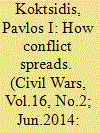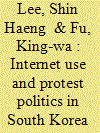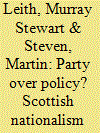| Srl | Item |
| 1 |
ID:
133581


|
|
|
|
|
| Publication |
2014.
|
| Summary/Abstract |
This article examines the escalation of protest mobilization into armed conflict in the Republic of Macedonia (2001). The analysis argues that violence occurred because of a timely collusion between proximate causes and permissive conditions (causes). The state's inherent fragility and the perpetuation of unresolved grievances provided ground for the utilization of opportunity structures by dissident contestants. The study looks into the influence of spillover effects through the lens of contagion and diffusion effects including political radicalization, disputed borderlands refugee flows, and rebel capacity, and provides an assessment of the conditions shaping the decision of the Albanian rebels to use violence. Drawing from a series of elite interviews and documents, the article offers a critical insight into how ethno-regional interdependencies render a largely non-violent conflict susceptible to escalation. The study finds that contagion, disputed borderlands, and the availability of existing operational networks have played a crucial, if not decisive, role in the decision of politically active Albanians in the Republic of Macedonia to use violence.
|
|
|
|
|
|
|
|
|
|
|
|
|
|
|
|
| 2 |
ID:
165228


|
|
|
|
|
| Summary/Abstract |
This study examines the association between Internet use and protest politics in South Korea and Taiwan, using secondary data from the sixth wave (2010–14) of the World Values Survey. The data show that Internet use is positively associated with low-cost protest acts, like signing a petition. Internet use is also correlated with the willingness to consider higher-cost actions such as attending demonstrations and joining in boycotts. But it does not appear to consistently increase actual protests of this sort. Discussion is made to address comparable opportunity structures for protest politics in the two East Asian democracies, where the Internet is deeply integrated into the country's political landscape.
|
|
|
|
|
|
|
|
|
|
|
|
|
|
|
|
| 3 |
ID:
096264


|
|
|
|
|
| Publication |
2010.
|
| Summary/Abstract |
The Scottish National Party (SNP) won control of Scotland's devolved government in the 2007 election yet opinion polls show no majority for its objective of independence in Europe. While the party is adept at exploiting short-term political opportunity structures in the wider British context, as well as appealing to the 'opinion electorate', it appears less successful at persuading a majority of Scottish voters to agree with its core ideology. Helpful parallels can be drawn between 2007 and the last time the party polled over 30 per cent of the popular vote in Scotland at the 1974 (October) British General Election-then, as now, the Scottish voter appears to be willing to distinguish between party and policy.
|
|
|
|
|
|
|
|
|
|
|
|
|
|
|
|